BOGOTA.- He Colombian President Gustavo Petro installed a new legislative period in Congress that will be key to the future of the ambitious social reforms for which he proposed a political agreement and which he will continue to insist on when he reaches the halfway point of his term.
He corruption scandal in the National Unit for Risk and Disaster Management (Ungrd) for alleged cost overruns in contracts that would have served as bribes in favor of the “social reforms” of the leftist ruler is the backdrop to the beginning of the new legislature in which Petro focuses his hopes to undertake the reforms that he assures Colombia needs. Meanwhile, former officials, ministers and congressmen are being questioned and some are facing judicial investigations.
Before the full Congress, Petro apologized for alleged corruption caseespecially by naming the former director who is being investigated by the prosecution: “There is a political responsibility… and I have to assume it.” The president promised to recover the money.
Petro bets on social reformsas part of his campaign promises, arguing that it is to reduce the “inequality gap,” which he considers a preponderant problem in the country. However, the victories have been few. The most notable was the pension reform approved in June, which changes the scheme that has been in place for three decades. But the health reform and the law to regulate the educational system foundered in the attempt.
The president denies the alleged bribes to legislators in exchange for their approval of his reforms. “Perhaps it is because we do not buy congressmen that our reforms have not been approved,” he tries to justify.
“Fast track”
The president announced that his government will present the “concerted” health reform to Congress again and a package of initiatives that aim to “speed up” the implementation of the peace agreement which was signed in 2016 by the State and the defunct guerrilla group Revolutionary Armed Forces of Colombia (FARC).
The way to speed things up, he explained, will be through a “fast track,” a formula for passing laws quickly in Congress that was used temporarily seven years ago and is being revived.
“We are not going to deviate one bit from what the peace agreement says,” said Petro, in relation to his critics’ fear that it will be an excuse to try to approve other norms that have nothing to do with peace, such as seeking presidential reelection, which is currently prohibited in the country.
But the fast track is not easy. Congress must approve a law establishing the legal instruments for the process to be expedited, which would take several months, and then the Constitutional Court will decide whether or not the proposal is in accordance with the Constitution.
Petro said that the rapid processing of the laws “implies political agreements to develop the changes in regulations to make the peace agreement a reality and the changes in regulations that allow us to reactivate the economy in agriculture, housing, tourism and industry.”
He insisted on the importance of Congress discussing and approving a possible agrarian reform as a way of fulfilling the 2016 peace agreement in which it says that three million fertile hectares must be given to the peasantry. During his government, 184,000 hectares have been granted, so Petro pointed out that at this rate it will take 20 years to comply.
Outside Congress, in Plaza Bolívar, approximately 300 anti-government protesters gathered, chanting: “Petro, you scoundrel, we want him to go.”
“We will recover this country through democratic and constitutional means, and in 2026 we will have a new government that can take back from the hands of this perverse government the country that is destroying us,” said Alejandro Ospina, president of the Union of Workers in the Oil and Energy Industry of Colombia.
The current Congress – elected in March 2022 by popular vote – is diverse in its political forces and has an unprecedented representation of the left, although not enough to form a majority. Petro still has to convince the political center and the right-wing parties.
“The constituent assembly would bring desolation”
The new president of Congress, the conservative Efraín Cepeda, is against the constituent assembly promoted by Petro. “It would be a leap into the void,” “He said in an interview with Semana.com. Cepeda ruled out that a constituent assembly could be convened only for specific issues. “It is not true that it can be convened for just a few issues. Our Constitution is young and has already had 58 amendments,” he said.
And he hammered home “The constituent assembly would bring devastation and I am not on that side.”
Cepeda said he will promote dialogue among all Colombians from Congress and “we will wait to see if there is consensus, but listening to the communities and then there may be reforms.”
The new president of the Colombian Congress emphasized that legislators “cannot be notaries of anything. Congress is not a notary, and the Conservative Party is even less so. The search for consensus is very important, but it must be with all sectors, because we must restore the confidence of Colombians who distrust all institutions.”
The former presidents of the Senate, Iván Name, and of the House of Representatives, Andrés Calle, are being investigated by the Supreme Court of Justice for alleged corruption. Sneyder Pinilla, a former employee of Ungrd, investigated by the Attorney General’s Office, reported that part of the money for the purchase of the tank trucks for 12 million dollars that resulted in cost overruns would have ended up in the personal coffers of the congressmen. Name and Calle deny these accusations.
Source: With information from AP / Semana.com

